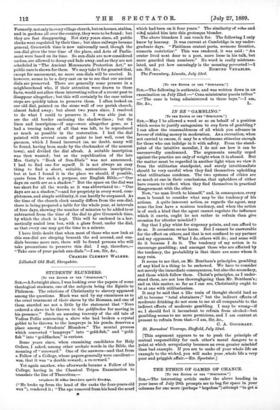IN RE " GAMBLING."
rTo THE EDITOR OF THE " SPECTATOR:1 SIR,—May I be allowed a word or so on behalf of a position which seems to justify antagonism to any form of gambling I can allow the reasonableness of all which you advance in favour of risking money in moderation. As a recreation, when not carried to excess, it may be a wholesome stimulus enough for those who can indulge in it with safety. From the stand- point of the intuitive moralist, I do not see how it can be unreservedly condemned. The arguments usually urged against the practice are only of weight when it is abused. Bub the matter must be regarded in another light when we view it from the utilitarian standpoint, and surely intuitionalists should be very careful when they find themselves upholding what utilitarians condemn. The two systems of ethics are so much at one in their conclusions, that upholders of either have reason to reflect when they find themselves in practical disagreement with the other.
Now, "no man liveth to himself," and, in consequence, every man is bound to consider what may be the tendency of his actions. A quite innocent action, as regards the agent, may none the less have a noxious tendency, and when the action is of such a kind that the agent cannot regulate the influence which it exerts, ought he not rather to refrain than give occasion for ulterior mischief ?
Say that I play whist for sixpenny points, and can afford to do so. It occasions me no harm. But I cannot be answerable for the effect on others, and that is not confined to my partner and my opponents. What I do, others will do ; and some will do it because I do it. The tendency of my action is to encourage gambling ; and amongst those who are affected by the tendency, the probability is that there are some whom it may ruin.
It seems to me that, on Mr. Bentham's principles, gambling of any kind is a thing to be eschewed. We have to consider not merely the immediate consequences, but also the secondary, and those which follow them. Christ's principles, as I under- stand them, are not less thoroughgoing than Mr. Bentham's ; and on this matter, so far as I can see, Christianity ought to be at one with utilitarianism.
It may be said that a like train of thought should lead us all to become "total abstainers ;" but the indirect effects of moderate drinking do not seem to me at all comparable to the indirect effects of moderate gambling. I may be wrong—if so, I should feel it incumbent to refrain from alcohol—but gambling seems to me more pernicious, and I am content at present to refrain from that.—I am, Sir, &c.,
C. A. GOODHABT. St. Barnabas' Vicarage, Sheffield, July 22nd. C. A. GOODHABT. St. Barnabas' Vicarage, Sheffield, July 22nd.
[This argument appears to us to push the principle of mutual responsibility for each other's moral dangers to a point at which scrupulosity becomes an even greater mischief than bad example. If you are to make of your whole life an example to the wicked, you will make your .whole life a very, poor and priggish affair.—En. Spectator.]


































 Previous page
Previous page